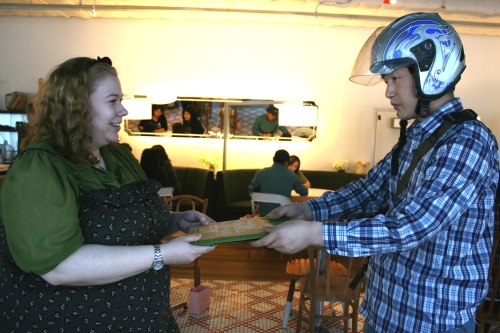A working housewife living in Bundang, Gyeonggi Province, recently had her worn-out furniture moved to an upholstery factory for just 20,000 won thanks to an errand service.
“I couldn’t ask my husband or my brother to help move the furniture because they were both so busy working. Then, I came across an errand service that does odd things for you at a low price,” she wrote, thanking the service on its website.
Errand services have rapidly gained popularity over the last two years. The number of businesses has surged from 10 operating in and around Seoul to 200 with a nationwide coverage.
They do trivial tasks, from delivering small items such as hamburgers, cigarettes and even sanitary napkins to heavy goods such as furniture and home appliances.
“The first and foremost thing to do upon calls from customers is to dispatch messengers. They handle a wide range of errands from household chores to grocery delivery,” said Cho Min-ki, who has run errand service company Boom Boom for six months now in Gwangju, Gyeonggi Province.
About 80 percent of customers placing orders with Boom Boom are women. In most cases, single women want Boom Boom workers to deliver groceries or do other household chores, while housewives get them to do household chores rather than shop for groceries, according to Cho.
In crowded quarters including a wealthy southern district of Gangnam or downtown Seoul, customers want more diverse errands such as paying utility bills, delivering birthday gifts to friends and families and attending classes.

An errand service company employee delivers a book to a customer in Gangnam, Seoul. (Lee Woo-young/The Korea Herald)
Errand services are also attractive to foreign English teachers in Korea like Mary Katherine Chadwick of English language academy YBM in the western Seoul district of Youngdeungpo.
“Foreign teachers want to go somewhere between their morning and afternoon shifts, but going there takes more than an hour. So we always joked about having lackey service,” said Chadwick.
“The fact that we can get something in that time, and have them delivered to me seems very convenient.”
Rates vary depending on delivery distance, time required to complete an errand and its difficulty. Aside from the cost of the item being brought, delivery fee is usually around 6,000 to 8,000 won. However, in case of time-consuming household chores, about 15,000 to 20,000 won is charged per hour.
The recent surge in popularity of errand services indicate that people have no qualms about asking strangers to run errands involving personal affairs and that they are willing to pay for it.
“As people lead a very busy life nowadays, they want to get odd duties done more efficiently,” said Cho. “In the old days, errands were jobs done among neighbors, who would ask or accept favors easily. The practice brought them closer together, but in busy modern society, people feel it is difficult to ask even acquaintances to go on errands for money.”
A consumer scientist agrees that the rise of errand services reflect a lifestyle putting convenience before everything else.
“Demand for errands will grow as the number of nuclear families and single households is on the increase,” said Kim Si-wuel, professor of consumer information science at Konkuk University.
According to Kim, errand service debuted five years ago here in the form of attending wedding ceremonies or funeral services like relatives or friends.
Now, service is much diversified. Lee Byoung-hoon, sociology professor of Chung-Ang University, interprets the diversity as a social phenomenon showing a more affluent Korea in which people do not regard purchase of errands as a waste of money.
“The increase in the number of errand service firms also means that the type of jobs in Korean society has been diversified. That’s a clear indicator that the society is economically developed as much,” Lee said.
Concerns
However, the development of errand services is not without side effects. News reports said that minors buy cigarettes to smoke via errand service or that some college students have skipped classes by getting messengers to attend on their behalf.
“To stem such problems, the government needs to set strict standards on errand service and monitor them,” Kim of Konkuk University said.
He also said that these days customers tend to get personal things done only with money, though they are trivial. Such consumer behavior, which does not give thought to alternatives, is not desirable, he said, noting the necessity of customer education.
“My nephew, a college student, once bought cooked rice through errand service, just because he did not want to step out of the house. He paid a 1,000 won errand fee, separately from the product price,” Kim said.
Errand services create new job opportunities as an industry but errand jobs are likely to be low-paying, Lee of Chung-Ang University said.
Most of the messengers are part-timers in their early 20s or 30s and out of the social safety net. So, regulations on minimum wage, national pension and public insurance do not apply to them.
“There is no reason to oppose the increase of this kind of job, but we need to guarantee that employees receive just rewards and social protection,” said Lee. “The government needs to extend regulations to them so that they can receive basic benefits,” Lee added.
By Lee Woo-young (
wylee@heraldcorp.com)





![[From the Scene] Monks, Buddhists hail return of remains of Buddhas](http://res.heraldm.com/phpwas/restmb_idxmake.php?idx=645&simg=/content/image/2024/04/19/20240419050617_0.jpg&u=20240419175937)
